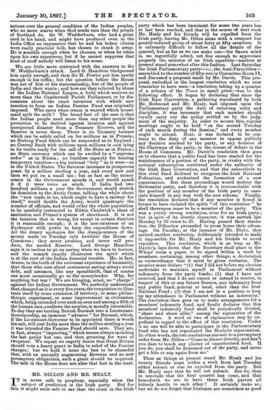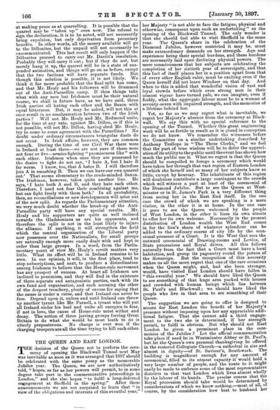MR. DILLON AND MR HEALY.
IT is never safe to prophesy, especially when the subject of prediction is the Irish party. But for this it might seem safe to say that the crisis in the Irish party which has been imminent for some two years has at last been reached, and that in the course of next week Mr. Healy and his friends will be expelled from the Irish party, leaving Mr. Dillon alone with a compact but greatly reduced group of about forty or fifty, members. It is extremely difficult to follow all the details of the quarrel, but as far as we can make out—the Saxon mind is, we regretfully admit, not fine enough to appreciate properly the minutia) of an Irish squabble—matters at present stand somewhat after this fashion. Last Saturday the Irish Parliamentary party—i.e., the Anti-Parnellites- assembled to the number of fifty-one in Committee Room 15, and discussed a proposal made by Mr. Davitt. This pro- posal, embodied in the longest resolution which we ever remember to have seen—a resolution taking up a quarter of a column of the Times in small print—was to the following effect. It began by declaring that since the Irish Race Convention, a gathering repudiated by both Mr. Redmond and Mr. Healy, had imposed upon the Parliamentary party the duty of enforcing unity and discipline, it was necessary that each member should loyally carry out the policy settled on by the judg- ment of the majority. In order to secure this, regular meetings ought to be held "on the second Tuesday of each month during the Session," and every member ought to attend. Next, it was declared to be con- trary to the duty of any member to oppose publicly any decision reached by the party, or any decision of the Chairman of the party, in the course of debate in the House of Commons. Mr. Davitt's resolution then goes on to observe that a public fund has been started for the maintenance of a portion of the party, in rivalry with the national subscription instituted under the authority of the Irish Race Convention, and that the subscribers to this rival fund declined to recognise the Irish National Federation, and authorised the formation of a new organisation. But these proceedings would destroy the Nationalist party, and therefore it is irreconcilable with the position of any member of the Irish party to asso- ciate himself in any way with the new scheme. Finally, the resolution declares that if any member is found in future to have violated the spirit "of this resolution" he shall thereupon cease to be a member of the party. This was a pretty strong resolution, even for an Irish party ; but in spite of its drastic character, it was carried last Monday by 33 votes to 21. Having passed their resolu- tion, the Dillonites proceeded to press home their advan- tage. On Tuesday, at the instance of Mr. Blake, they carried another resolution, deliberately intended to make it impossible for Mr. Healy and his friends to avoid expulsion. This resolution, which is as long as Mr. Da,vitt's, lays down that the Secretary shall place in the Whips' room a paper, to be signed within a week by members, containing, among other things, a declaration so extraordinary that it must be given verbatim. The member must declare "(1) that I did not before my election undertake to maintain myself in Parliament without indemnity from the party funds; (2) that I have not received, and that I do not expect or intend to receive, in respect of this or any future Session, any indemnity from any public fund, general or local, other than the List National Fund ; (3) that I am not in a position to keef up my attendance in Parliament without an indemnity." The resolution then goes on to make arrangements for a members' indemnity fund, and finally declares that this members' indemnity fund shall be periodically divided, "share and share alike," among the signatories of the declaration. A word or two of explanation may be ex- pedient in regard to the effect of this resolution. Under it no one will be able to participate in the Parliamentary fund who has not repudiated the Healyite organisation. In other words, the two resolutions amount to a peremptory order from Mr. Dillon—' Come to dinner directly, and don't you dare to touch any platter of unauthorised food. If you do, you shall be drummed out of the party, and never get a bite or sup again from me.'
Thus as things at present stand Mr. Healy and his twenty friends must within a week from last Tuesday either submit or else be expelled from the party. But Mr. Healy says that he will not submit. Are we, then to conclude that the final quarrel has come, and that henceforth we are to have three Irish parties all bitterly hostile to each other ? It certainly looks so ; but we do not forget that Irishmen are sometimes as good at making peace as at quarrelling. It is possible that the quarrel may be "taken up" even now. The refusal to sign the declaration, it is to be noted, will not necessarily bring expulsion, but only deprivation from pecuniary benefits. In other words, all the money available will go to the Dillonites, but the unpaid will not necessarily be excommunicated. This last result will only happen if the Dillonites proceed to carry out Mr. Davitt's resolution. Probably they will carry it out; but if they do not, but merely hang it up, the quarrel will be in a state of sus- pended animation, and things will go on as before, except that the two factions will have separate funds. But though this solution is possible, it is not likely. We think it far more probable that the final split has come, and that Mr. Healy and his followers will be drummed out of the Anti-Parnellite camp. If then things take what with any men but Irishmen must be their natural course, we shall in future have, as we have said, three Irish parties all hating each other and the Saxon with equal bitterness. But, it may be asked, will not this at once result in an amalgamation between two of the Irish parties ? Will not Mr. Healy and Mr. Redmond unite, for the time at any rate, against Mr. Dillon, or if this is not possible, will not Mr. Dillon, having shed Mr. Healy, try to come to some agreement with the Parnellites ? No doubt under ordinary circumstances triangular duels do not occur. In Irish affairs, however, they are common enough. During the time of our Civil War there were in Ireland at least three—we are not sure if there were not four or five—armies fighting "promiscuous like" with each other. Irishmen when once they are possessed by the desire to fight do not say, I hate A, but I hate B far worse. I know, too, that A hates B. I will therefore join A in smashing B. Then we can have our own quarrel out.' That seems elementary to the crude-minded Saxon. The Irishman, however, takes quite another line. He says, 'I hate both A and B, and they hate each other. Therefore, I need not fear their combining against me, but can fight freely with them both.' In all probability, then, no reconciliations or new developments will arise out of the new split. As regards the Parliamentary situation, we very much doubt whether the break-up of the Anti- Parnellite party will have any special results. Mr. Healy and his supporters are quite as well inclined towards the Gladstonians as are his opponents, and therefore the split is not in the least likely to injure the alliance. If anything, it will strengthen the hold which the central organisation of the Liberal party now possesses over the Nationalists, for small groups are naturally enough more easily dealt with and kept in order than large groups. In a word, from the Parlia- mentary point of view Mr. Healy's revolt matters very little. What its effect will be in Ireland remains to be seen. In our opinion, it will, in the first place, tend to stop subscriptions, and next, to produce a disinclination among Irishmen to believe that the Home-rule movement has any prospect of success. At heart all Irishmen are inclined to pessimism, and they will find in the existence of three separate and antagonistic parties, each with its own fund and organisation, and each accusing the other of the deepest treachery, plenty of excuse for saying that the cause is under a curse, and that Ireland can never be free. Depend upon it, unless and until Ireland can throw up another tyrant like Mr. Parnell, a tyrant who will put all Ireland under his heel and unite all energies in fear, if not in love, the cause of Home-rule must wither and decay. The notion of three jarring groups forcing Great Britain to do what she would be most loath to do is utterly preposterous. No charge is ever won if the charging troopers are all the time trying to kill each other.



















































 Previous page
Previous page